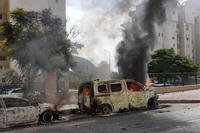The $500 million effort begun last December to train and equip Syrian rebels in the campaign against ISIS has produced thus far only four or possibly five fighters actually on the ground in Syria, the head of U.S. Central Command said.
"We're talking four or five," Army Gen. Lloyd Austin told senators on Wednesday. He acknowledged that Pentagon and the Obama administration had planned to have at least 3,000 Syrian rebels on the ground by the end of this year, building to an eventual force of about 5,400.
"It is taking a bit longer to get things done," the general said. "This is to be expected in the early stages of the fight."
Austin also promised the senators that he would protect whistleblowers in his command, essentially confirming that the Defense Department's Inspector General is investigating claims from some on Austin's vast intelligence staff that their reports on ISIS were being doctored to cover up setbacks.
The general said he has about 1,200 analysts and other personnel working for him on intelligence. If the IG's report turns up wrongdoing, "Be assured I will take appropriate action," he said.
But possibly the worst moments for Austin in a testy and defensive appearance in front of the Senate Armed Services Committee came when he repeatedly tried to maintain the fight against the Islamic State in Iraq and Syria, or ISIS, was making progress.
Senators from both sides of the aisle told him that the campaign against the extremist group was either a "failure," a "total failure," or an "abject failure."
Sen. Tim Kaine, D-Virginia, said that the campaign wasn't even legal in his opinion. He told Austin that campaign in Iraq and Syria wasn't covered under the Authorization for the Use of Military Force adopted by Congress after the Sept. 11, 2001, terror attacks.
Christine Wormuth, the Pentagon's undersecretary for policy, joined Austin to testify before the committee, but they first had to undergo a withering opening statement from the panel's chairman, Sen. John McCain, R-Arizona.
McCain has been a persistent critic of the campaign against ISIS but he took it to another level in scoffing at Austin's claims of progress and Wormuth's assertions of "slow but steady progress."
Austin sat stone-faced as McCain called his claims "divorced from reality. Basically, what you're telling us is everything is fine" but "this is an abject failure." In his 28 years in the Senate, "I never heard testimony like this, never."
Sen. Claire McCaskill, D-Missouri, said she was stunned to learn that the Pentagon might be seeking another $600 million for the Syrian rebel training program when the U.S. was counting the current number of fighters "on our fingers and toes. It's time for a new plan."
Sen. Kelly Ayotte, R-New Hampshire, said of the training program, "Let's not kid ourselves, that's a joke." Sen. Jeff Sessions, R-Alabama, added, "We have to acknowledge this is a total failure. I wish it weren't so, but that's the fact."
Austin's rough day continued after the hearing ended. CentCom had to put out a statement immediately afterward correcting part of his testimony which may have suggested that U.S. Special Forces troops were on the ground in Syria helping the Kurdish militia known as the YPG (People's Protection Units).
Austin testified that "what our Special Operations forces have done in northern Syria is they didn't wait for the New Syrian Force program or train and equip program to fully develop. At the very onset, they began to engage elements like the YPG and enable those elements, and they are making a difference on the battlefield."
CentCom said that Austin "was referring to the coordinating relationship that U.S. Special Operations Forces share with Syrian anti-ISIL (ISIS) forces. There are no U.S. military forces on the ground in Syria, nor have we conducted any U.S. military training of indigenous Syrian forces in Syria."
--Richard Sisk can be reached at Richard.Sisk@military.com





























